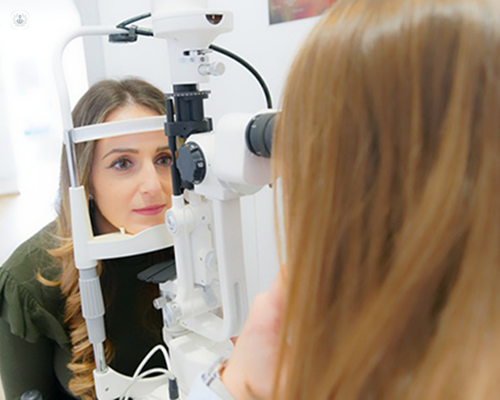Cataract surgery improves quality of life and decreases the risk of dementia
Written in association with:In this highly informative article, revered consultant ophthalmologist, Mr Abdallah Ellabban, shares his expertise on the benefits of cataract surgery, which extend far beyond improved clarity of vision.

What is a cataract?
The human eye is like a camera and has a 'lens' at the front part of the eye. The normal function of the lens is to focus light on the retina (the sensitive layer on the back of the eye), so that we can see clear and sharp images.
A cataract is a clouding of the lens inside the eye. Cataracts develop due to the ageing of the proteins inside the lens of the eye. With cataracts, the lens loses its transparency, and the vision gradually becomes foggy, making it difficult to carry out daily activities.
Cataract can cause different symptoms depending on the type and density of the cataract, such as:
- cloudy, misty, foggy or dim vision
- increasing difficulty with vision at night
- frequent changes in eyeglass or contact lens prescription
- colours not appearing as vividly
- seeing “halos” around lights
When the cataract interferes with lifestyle or daily activities, it will need treatment. Surgery is the only way to treat cataracts. Eye drops or stronger glasses will not help. The surgery involves removing the cloudy lens (cataract) and replacing it with a clear replacement lens (often called intraocular lens).
Fortunately, with modern technology, cataract surgery is a generally a safe and quick procedure. The surgery often takes between 10 and 15 minutes, and is performed while you lie down under local anaesthetic. Most people notice improvement in their vision from the next day.
However, the aim of cataract surgery is not limited to improvement of vision and there are other substantial benefits from cataract surgery.
Cataract surgery can improve quality of life
Quality of life means the physical, functional, social and emotional wellbeing of an individual. Visual impairment due to cataracts can negatively affect quality of life, leading to difficulties in daily activities, increased risk of falls and fractures, increased depression, social isolation, poorer general health, and increased mortality.
Recent research showed that improved vision after cataract surgery can significantly improve quality of life in many dimensions, including improved self-confidence in daily activities (such as walking, reading and driving) and enhanced participation in social activities.
Therefore, the goal of cataract extraction is not only to improve functional vision but also performance in daily living activities, and this is largely due to the effect that poor vision has on the quality of life, general health, social status and mortality rates.

Cataract surgery reduces the risk of dementia
Dementia is a general term for the decline in brain function in elderly people leading to memory loss, confusion, and problems with speech and understanding which get worse over time.
Researchers found that participants who underwent cataract removal surgery had nearly a 30 per cent lower risk of developing dementia and Alzheimer’s disease compared with participants without surgery. It is possible that cataract-related visual impairment decreases the neuronal input to the brain, and this may accelerate neurodegeneration seen in dementia.
“ My mother has dementia and she had cataract surgery. Her vision was better the next day and she is more confident walking around the house. Also watching the subtitles on TV is easier as she has hearing difficulty. She is now looking forward to having the second eye surgery. ”
Daughter of a patient
In conclusion, vision restoration after cataract surgery permits many activities, enhances qualify of life, reduces risk of falls, supports independence and helps to prevent future dementia.
Mr Abdallah Ellabban is one of the UK’s leading consultant ophthalmologists and is renowned for his specialist expertise in cataract surgery.
If you wish to schedule a consultation with him to discuss your treatment options, you can do so by visiting his Top Doctors profile.
Lamourex EL, et al. The impact of cataract surgery on quality of life. Current Opinion in Ophthalmology, 2011 Jan;22(1):19-27
Lee CS, et al. Association Between Cataract Extraction and Development of Dementia. JAMA Intern Med. 2022;182(2):134-141


